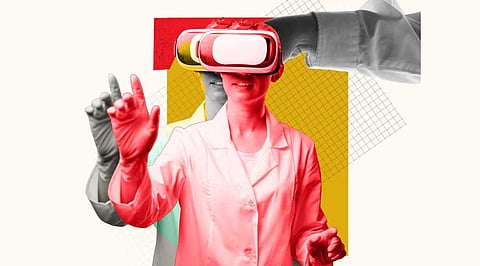

One of the most significant ways the Metaverse could enhance healthcare is through "virtual clinics," in which patients and doctors converse using computerized avatars to overcome barriers like distance and language. In contrast, patients can fully immerse themselves in virtual clinics, hospitals, or therapeutic environments with VR, boosting a sense of familiarity and reducing dread connected to medical settings.
Physical connections between patients and clinicians were necessary for healthcare up until a fairly recent time. Modern medical advancements like telemedicine, virtual reality (VR)-enabled medical education, robotic surgery, and other cutting-edge technologies have helped the healthcare sector advance rapidly throughout time.
Technology will undoubtedly continue to advance healthcare, and the metaverse will be crucial to this shift. The metaverse may provide unmatched chances to change healthcare by utilizing virtual reality, augmented reality, and other immersive technologies. This includes increased patient experiences, enhanced remote consultations, improved healthcare delivery, immersive medical training, and so on.
Predictions indicate that the Metaverse and the sector it supports will experience rapid growth in the next years. According to research published by Bloomberg Intelligence in December 2021, the market for electronics in the Metaverse might reach $800 billion by 2024 and $2.5 trillion by 2030. This would alter virtual reality technology and, consequently, the direction of healthcare in the future.
One of the most important ways the Metaverse could improve healthcare is through "virtual clinics," in which patients and doctors communicate via virtual avatars and distance and language barriers are irrelevant. In contrast, patients can fully immerse themselves in virtual clinics, hospitals, or therapeutic environments with VR, boosting a sense of familiarity and reducing dread connected to medical settings.
Doctors from other nations could examine a 3D representation of the patient's health to make an educated diagnosis. Hence, if the greatest doctor for your disease is in India but you're in Europe, you may easily be in the same room by donning a set of headsets. This can be especially beneficial in areas with a severe dearth of medical practitioners and in situations with exceedingly rare diseases with few experts in the field.
Another advantageous feature is that clinicians might use gamified tools to assist patients in understanding difficult diagnoses and have greater control and visibility over how they respond to medicine. In order to reduce the risk of failure during complicated surgeries, the Metaverse will also allow surgeons to visualize and simulate surgical processes.
Furthermore, by superimposing real-time data on the actual surroundings, augmented reality can improve the patient experience. This technology enables real-time monitoring of vital signs, medication adherence, and individualized counseling for medical administration during self-care operations, enabling seamless interactions between patients, carers, and medical professionals.
The Metaverse runs on a vast infrastructure, from reliable 6G connectivity to cutting-edge gear like eyewear, sensors, and other wearable gadgets. In order to receive the recommended therapies, patients might need to purchase specialized equipment. Yet it's still unclear whether insurance companies will pay for these costs.
Also, users can currently control their avatars using VR gloves and goggles. Yet, when working with patients, more advanced and discrete technologies are required. At the moment, AR, VR, and MR devices are neither portable nor affordable, which makes it difficult for the Metaverse to be widely used. In addition to improving hardware accessibility, technology must advance to reach the display quality and pixel density needed for a lifelike virtual experience.
Join our WhatsApp Channel to get the latest news, exclusives and videos on WhatsApp
_____________
Disclaimer: Analytics Insight does not provide financial advice or guidance. Also note that the cryptocurrencies mentioned/listed on the website could potentially be scams, i.e. designed to induce you to invest financial resources that may be lost forever and not be recoverable once investments are made. You are responsible for conducting your own research (DYOR) before making any investments. Read more here.
